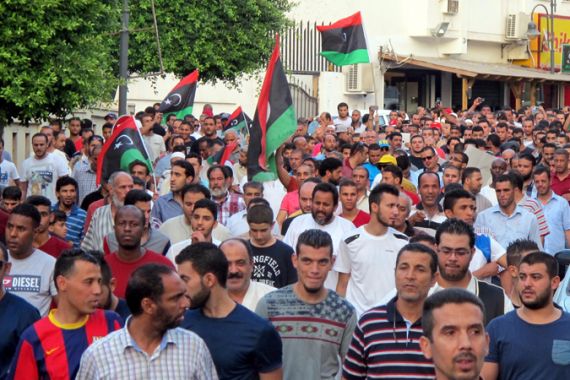Libya parliament holds emergency meeting
House of Representatives expected to set political framework and address escalating violence in country’s main cities.

Tripoli, Libya – Libya’s newly elected parliament is holding an emergency meeting to discuss the dwindling security situation threatening to tear the country apart.
The House of Representatives (HoR), elected in May, gathered on Saturday morning in an attempt to set a political framework, and guide Libya out of the pit of violence that has raged for weeks in certain parts of the country. The first official HoR session in scheduled for August 4.
“We want to speed up the handing over of process, because Libya cannot wait much longer,” said Jalal al-Shwehdi, a member of the HoR.
The HoR has 200 seats for members who were voted in from all around the country. However, because of violence in Derna, a town in eastern Libya under the control of Islamist militias who did not allow locals to vote – a scene replicated in a number of towns in the east and south of the country – only 188 seats were filled.
Sami Zaptia, a Libyan journalist and analyst, said he was optimistic about the HoR. “Libyans made a [more concerted] effort in choosing their candidates” compared to the 2011 elections, Zaptia said. “We hope they are the right people for the job,” he said.
RELATED: Libya burns as militias vie for control
But Nuri Abusahmin, chairman of the General National Congress, Libya’s previous parliament, announced in a statement on Wednesday that the first session should be held in Tripoli. A small number of candidates, including those from the city of Misrata, have supported Abusahmin, and will not be attending the Tobruk meeting.
This means that there may be two HoR sessions occurring simultaneously in two different locations on August 4, a decision Shwehdi called unconstitutional. “Some members would end up kidnapped and in the hands of militias if we were to meet in Tripoli,” he said.
“We can only conclude that this is their doing,” said Zaptia, explaining that holding the meeting in Tobruk puts the HoR out of the reach of Islamist groups, who may otherwise try to influence its decisions.
Meanwhile, the Ansar al-Sharia armed group, thought to be responsible for the 2012 attack on the US consulate, has declared Benghazi an Islamic Emirate, a move that resulted in hundreds of people taking to the streets on Wednesday night in an attempt to reclaim their city.
As of Friday, conflicts were still ongoing in different parts of Benghazi between locals and the Islamist group.
With Tripoli becoming a battlefield over the past two weeks, an estimated 6,000 Libyans have fled to Tunisia each day, Tunisia’s Foreign Minister Mongi Hamdi said. The Libyan health ministry also estimated that more than 100 people have been killed in the fighting.